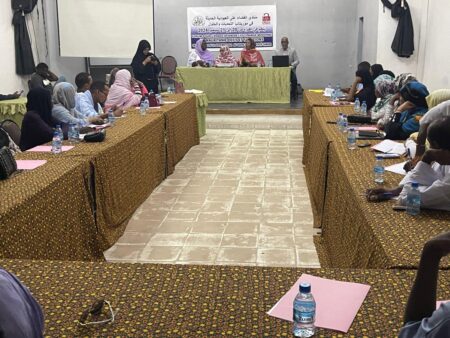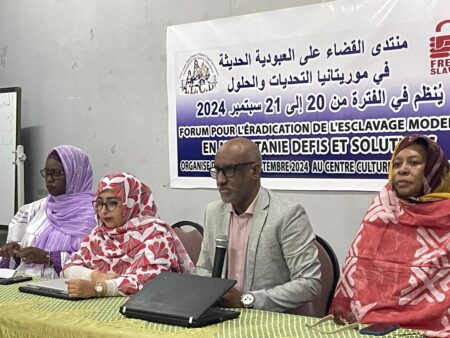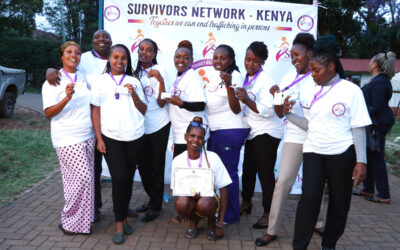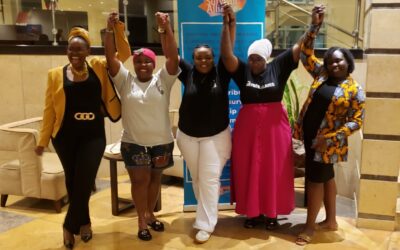In partnership with Free the Slaves (FTS), the Association de Lutte contre la Dépendance (ALCD) organized a two-day forum on September 20-21, 2024, at the Diadié CAMARA Cultural Center in Nouakchott, Mauritania. The event brought together a diverse group of stakeholders, including representatives from the Ministry of Justice, the Commission for Human Rights, Humanitarian Action, and Civil Society Relations (CHDAHRSC), civil society organizations, and local cooperatives. The goal: to address modern slavery in Mauritania and develop actionable recommendations to eradicate it.
Day 1: Understanding Modern Slavery
The forum opened with a focus on defining and contextualizing modern slavery in Mauritania. Speakers included Madame Toutou Ahmed Jiddou, President of ALCD, a Minister of Justice advisor, and Loube Henoune, Deputy Director of Human Rights at the CHDAHRSC. They emphasized the various forms of modern slavery, such as forced labor, forced begging, and child exploitation, which remain significant issues in the country.
Importantly, the forum highlighted Mauritania’s legislative framework, which includes landmark laws such as the 2012 constitutional amendment that defines slavery as a crime against humanity and the 2015 anti-slavery law (Law No. 2015.031) that strengthens penalties and ensures that slavery-related offenses are treated as serious crimes with no statute of limitations.
The participants reviewed the progress of Mauritania’s international commitments, including the International Covenant on Civil and Political Rights (ICCPR), while also examining the specific challenges of enforcing these laws and ensuring their applicability on the ground.
Day 2: Collaborative Solutions and Policy Recommendations
On the second day, the focus shifted to strategic action and collaboration. The forum provided an opportunity for government officials, civil society representatives, and local organizations to share insights into the obstacles to eradicating modern slavery and to identify actionable solutions. Participants discussed efforts to raise awareness, increase law enforcement accountability, and strengthen support for victims.
Breakout sessions allowed participants to work in groups, identifying SMART (Specific, Measurable, Acceptable, Realistic, and Time-bound) recommendations. These included:
- Combatting ignorance and extreme poverty, which fuel vulnerability to exploitation.
- Improving the enforcement of anti-slavery laws and ensuring their applicability to modern contexts.
- Engaging journalists more deeply in the fight against modern slavery by equipping them with tools to raise awareness effectively.
Additionally, the forum highlighted the critical importance of protecting vulnerable groups, including women, children, and migrants. Recommendations emphasized preventing early marriage, child labor, and forced migration, while stressing the role of community engagement in changing harmful traditions and customs.
Regional Awareness Campaigns
The forum was followed by three community-led campaigns to raise awareness about modern slavery in the cities of Arafat, Riyadh, and El Mina. These campaigns included public conferences, community caravans, and meetings with local authorities to strengthen anti-slavery efforts. The combined participation of 250 community members demonstrated a strong commitment to ending slavery at the grassroots level.
Key Outcomes
The forum resulted in several significant outcomes:
- Stronger Coordination: Participants stressed the importance of better coordination between government bodies, civil society, and international partners.
- Increased Awareness: The campaigns led to a greater awareness of modern slavery issues, particularly around child labor and forced marriages.
- Capacity Building: The event provided an important platform to strengthen the capacity of participants to address modern slavery through enhanced knowledge and skills.
Looking Ahead
The forum concluded with a commitment from participants to implement the recommendations and continue the fight against modern slavery. Free the Slaves and ALCD will work closely with local actors to ensure that these recommendations lead to concrete actions that protect vulnerable populations and strengthen community resilience against exploitation.
This forum marks a critical step forward in Mauritania’s fight against modern slavery, underlining the importance of collaborative action and the need for sustained efforts to protect the rights and dignity of all individuals.










